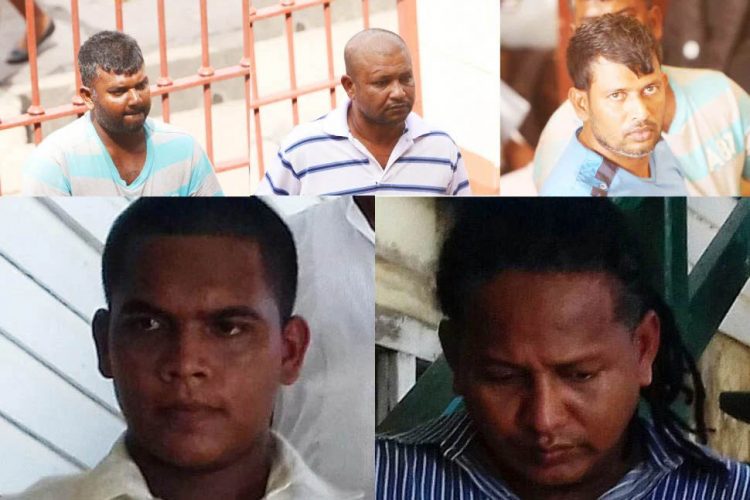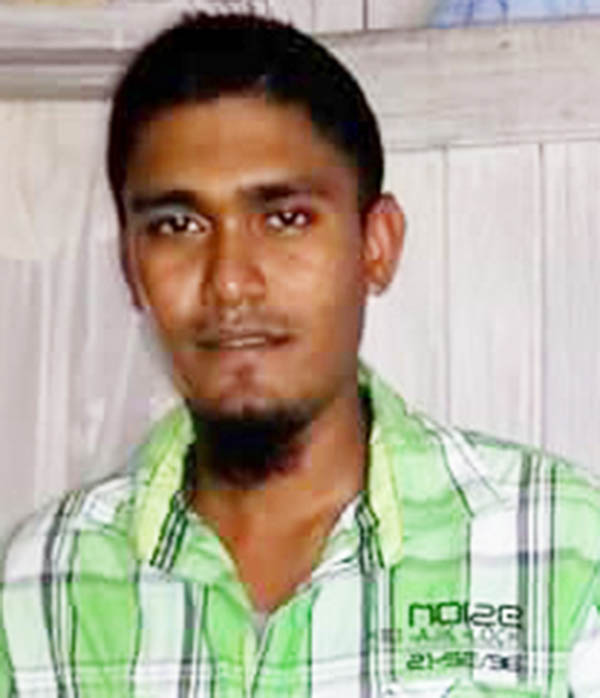The five men who were convicted last year of murdering Number 70 Village, Corentyne carpenter, Faiyaz Narinedatt in 2016 were yesterday sentenced to sixty-six years in jail by Justice Navindra Singh.
The deceased’s mother in court told the men that they had destroyed her life and turned her into a person she does not like as she reminded them that they were all from the same village and yet they chose to brutally murder her son.
The five convicted men are Orlando Dickie, 45, Radesh Motie, 46, Diodath Datt, 24, Harri Paul Parsram, 56, and Niran Yacoob, 42.

In November 2022, the five men were found guilty of the carpenter’s murder by a jury at the conclusion of their trial at the High Court in Berbice, where the main witness had testified to hearing the order to beat the man to death after he refused sexual advances allegedly made by Marcus Bisram.
Bisram was last year cleared of a murder charge after an extensive court battle that was decided by the Caribbean Court of Justice (CCJ), which said he could only be prosecuted by way of “fresh evidence.”
Brutal beating
Yesterday, Justice Singh in sentencing the men stated that they showed no remorse as he labeled the incident a “brutal beating…In fact, they continue to deny involvement in the incident that has claimed the life of Faiyaz Narinedatt.”
The convicted men yesterday told the court that they were sorry that a life was lost. When questioned by the judge if they were sorry a life was lost or were sorry that their actions caused a life to be lost, the men would only apologize for a life being lost.
Justice Singh in sentencing added, “But saying that they are sorry a life was lost cannot amount to a show of remorse in a sentencing arena.”
He said that in examining the evidence and what was said by the accused persons, there are no mitigating circumstances to be taken into account on behalf of any of them.
Justice Singh said that based on the evidence, at one stage, Narinedatt was trying to leave the location but he was pursued and brought back.
Attorney Arud Gossai yesterday on behalf of Motie said, that only the accused’s car was used in the incident. However, the judge said, “that might actually be the worst part of it because what was the car used to do?”
Justice Singh in sentencing the men yesterday stated that the post-mortem examination, supported by testimony from the eyewitness, gives a clear understanding of a “brutal beating.”
He said that “the injuries are so numerous”, as he questioned that even if the men were angry with the victim and got into a fight “at some point of time where there is not a response from the other person you must want to stop beating that person, this is a brutal beating, I don’t know how one human can be like this to another human being.”
As such, he sentenced each of the men to 66 years in prison with the possibility of parole after serving a minimum of 25 years.
“Ayo destroyed my life”
Meanwhile, Narinedatt’s mother, Bibi Shikira Aziz, told the court yesterday, that her son and the men were friends before the incident and they snatched his life away. “Them turn back and kill me son, them know Faiyaz alone me had, me na had anymore pickney… From that day till today it na easy for me, it na easy, a pain meh heart”, the woman said as she broke into tears in the courtroom.
She said Narinedatt’s children always ask for him and she is forced to tell them “Papa na come back.”
The woman then told the accused, that “All abbay was one village people, ayo should a think twice before ayo hurt me son, think twice.” She then told them that because of what they did she is not the same person she was before, “I am somebody different and I don’t like who I am, I don’t like who I am… Me just hate myself how I become, I am not the person who I used to be and ayo this responsible for that… Ayo destroy my life, ayo just destroy my life entirely and I will never be happy again no matter wah me do.”
Narinedatt’s father, Narendranauth Datt, who was also in tears told the court that he’s related to one of the accused and they still beat his son to death. “Them know me son and fa brutal me son like that, them na human beings”, he said.
The state in the trial of the five men, which was represented by special prosecutor Latchmie Rahamat and state prosecutor Nafeeza Baig, called 26 witnesses to make its case.
Attorney Mursaline Bacchus represented Dickie, Motie, and Datt, while attorney Gossai represented Parsram and Yacoob.
Summed up
After Justice Singh summed up the matter last year, the members of the jury deliberated for several hours after which they returned with a unanimous guilty verdict for each of the accused.
Narinedatt was found lying lifeless on the Number 70 Village Public Road, Corentyne on November 1, 2016, with marks of violence about his body.
Investigators were initially treating the matter as a hit-and-run accident. However, relatives of Narinedatt pleaded with the police to further investigate the incident as they believed he had been murdered, based on information provided to them.
A post-mortem examination revealed that he died from a fractured skull but had also sustained a fractured spine and other injuries about his body.
During the summing up by Justice Singh, the court heard that the main witness testified that he was present at Bisram’s party, where the five accused among others including Narinedatt, were also present.
The witness, who was a juvenile at the time, said that at that time Narinedatt had no injuries about his body.
He testified that Narinedatt was drinking after which he went to the washroom, where he claimed that Bisram attempted to touch his private parts. The judge in summing up the witness’s evidence, said the witness related that Narinedatt rebuffed Bisram and he slapped him five times.
Judge Singh continued, “He (witness) testified that Marcus then walked through the house and told the five accused persons that Faiyaz just slap me ayo go beat am till he dead…. He testified that the five accused then went to Faiyaz and started chucking up Faiyaz and started to beat him and carry him out [to] the yard.”
The judge said the witness testified that they pulled out five pickets from the fence opposite Bisram’s house and “start to beat Faiyaz all over his body and head.”
According to the witness, at that stage the men beat Narinedatt and took him further up the street.
The judge then noted, that during cross-examination the witness testified that they pulled out one picket, which he claimed they shared to beat Narinedatt. “He said Faiyaz then run up the street about two lots but they catch him and bring him back then Faiyaz and the Number 1 accused (Dickie) fell into a drain and the Number 3 (Datt) and Number 4 (Parsram) pulled them out.”
Furthermore, the witness testified that the Number 2 accused (Motie) then brought his car, and Datt and Parsram put Narinedatt in the trunk of that car “and this time Faiyaz was not moving.”
Additionally, the judge highlighted that the witness’s statement in the magistrate’s court differed from the evidence given in the High Court. However, the witness claimed, that he was afraid to tell investigators what he saw transpire since the police would often also attend Bisram’s parties.
The witness also claimed that a Berbice attorney advised him to stick to the statement he had given to the police of not knowing anything hence he said the same in the magistrate’s court.
Justice Singh stressed, that all of the accused persons denied being involved in any incident whereby the injuries were and could have been inflicted on Narinedatt.
In March 2022, the CCJ’s ruling concluded a two-year-legal battle waged by Bisram against the Director of Public Prosecutions (DPP) directive that he be committed to stand trial for the murder.
Following a Preliminary Inquiry at which he was discharged by a magistrate in March of 2020, Bisram was rearrested on the direction of the DPP, who invoked her powers under Section 72 of the Criminal Law (Procedure) Act, ordering that he be committed to face trial before a judge and jury.
High Court judge Simone Morris-Ramlall would, however, later quash the committal order based on an application by his lawyers.
DPP Shalimar Ali-Hack, however, appealed that ruling, which the Court of Appeal last year overturned, paving the way for Bisram to be taken back into custody to await trial.
He, however, successfully petitioned the CCJ for a stay of the judgment of the local appellate court pending its final ruling as he contended that the DPP’s directive was unlawful.
From top left to right: Niran Yacoob, Harri Paul Parsram, Radesh Motie. Bottom left to right: Diodath Datt, Orlando Dickie





